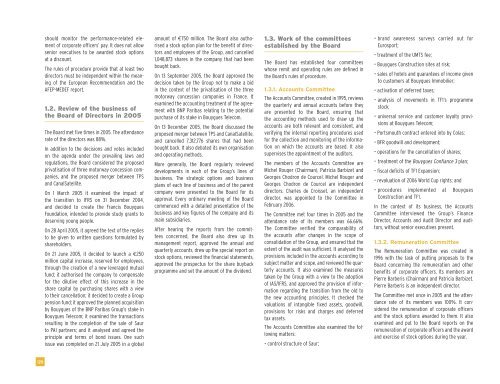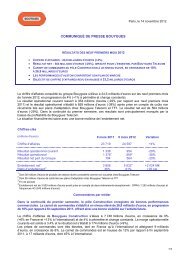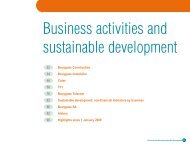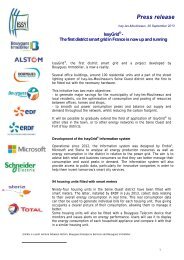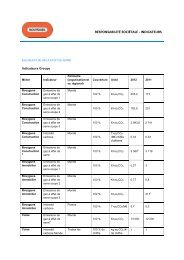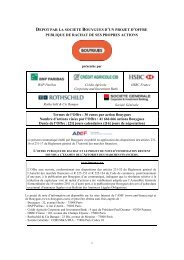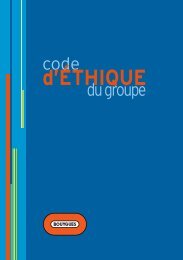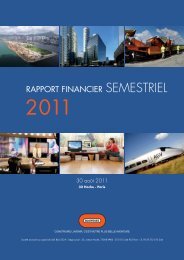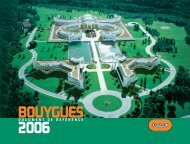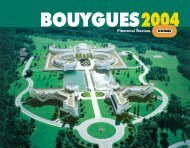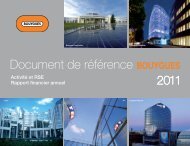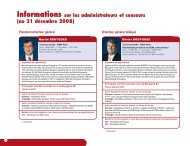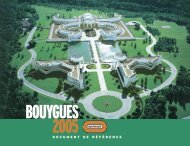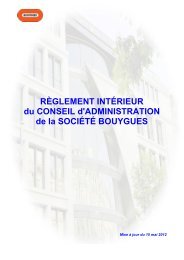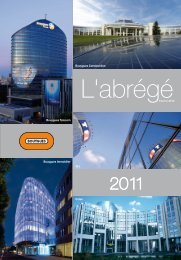A N N U A L R E P O R T - Bouygues
A N N U A L R E P O R T - Bouygues
A N N U A L R E P O R T - Bouygues
Create successful ePaper yourself
Turn your PDF publications into a flip-book with our unique Google optimized e-Paper software.
should monitor the performance-related element<br />
of corporate officers’ pay. It does not allow<br />
senior executives to be awarded stock options<br />
at a discount.<br />
The rules of procedure provide that at least two<br />
directors must be independent within the meaning<br />
of the European Recommendation and the<br />
AFEP-MEDEF report.<br />
1.2. Review of the business of<br />
the Board of Directors in 2005<br />
The Board met five times in 2005. The attendance<br />
rate of the directors was 88%.<br />
In addition to the decisions and votes included<br />
on the agenda under the prevailing laws and<br />
regulations, the Board considered the proposed<br />
privatisation of three motorway concession companies,<br />
and the proposed merger between TPS<br />
and CanalSatellite.<br />
On 1 March 2005 it examined the impact of<br />
the transition to IFRS on 31 December 2004,<br />
and decided to create the Francis <strong>Bouygues</strong><br />
Foundation, intended to provide study grants to<br />
deserving young people.<br />
On 28 April 2005, it agreed the text of the replies<br />
to be given to written questions formulated by<br />
shareholders.<br />
On 21 June 2005, it decided to launch a €250<br />
million capital increase, reserved for employees,<br />
through the creation of a new leveraged mutual<br />
fund; it authorised the company to compensate<br />
for the dilutive effect of this increase in the<br />
share capital by purchasing shares with a view<br />
to their cancellation; it decided to create a Group<br />
pension fund; it approved the planned acquisition<br />
by <strong>Bouygues</strong> of the BNP Paribas Group’s stake in<br />
<strong>Bouygues</strong> Telecom; it examined the transactions<br />
resulting in the completion of the sale of Saur<br />
to PAI partners; and it analysed and agreed the<br />
principle and terms of bond issues. One such<br />
issue was completed on 21 July 2005 in a global<br />
amount of €750 million. The Board also authorised<br />
a stock option plan for the benefit of directors<br />
and employees of the Group, and cancelled<br />
1,048,873 shares in the company that had been<br />
bought back.<br />
On 13 September 2005, the Board approved the<br />
decision taken by the Group not to make a bid<br />
in the context of the privatisation of the three<br />
motorway concession companies in France. It<br />
examined the accounting treatment of the agreement<br />
with BNP Paribas relating to the potential<br />
purchase of its stake in <strong>Bouygues</strong> Telecom.<br />
On 13 December 2005, the Board discussed the<br />
proposed merger between TPS and CanalSatellite,<br />
and cancelled 7,312,776 shares that had been<br />
bought back. It also debated its own organisation<br />
and operating methods.<br />
More generally, the Board regularly reviewed<br />
developments in each of the Group’s lines of<br />
business. The strategic options and business<br />
plans of each line of business and of the parent<br />
company were presented to the Board for its<br />
approval. Every ordinary meeting of the Board<br />
commenced with a detailed presentation of the<br />
business and key figures of the company and its<br />
main subsidiaries.<br />
After hearing the reports from the committees<br />
concerned, the Board also drew up its<br />
management report, approved the annual and<br />
quarterly accounts, drew up the special report on<br />
stock options, reviewed the financial statements,<br />
approved the prospectus for the share buyback<br />
programme and set the amount of the dividend.<br />
1.3. Work of the committees<br />
established by the Board<br />
The Board has established four committees<br />
whose remit and operating rules are defined in<br />
the Board’s rules of procedure.<br />
1.3.1. Accounts Committee<br />
The Accounts Committee, created in 1995, reviews<br />
the quarterly and annual accounts before they<br />
are presented to the Board, ensuring that<br />
the accounting methods used to draw up the<br />
accounts are both relevant and consistent, and<br />
verifying the internal reporting procedures used<br />
for the collection and monitoring of the information<br />
on which the accounts are based. It also<br />
supervises the appointment of the auditors.<br />
The members of the Accounts Committee are<br />
Michel Rouger (Chairman), Patricia Barbizet and<br />
Georges Chodron de Courcel. Michel Rouger and<br />
Georges Chodron de Courcel are independent<br />
directors. Charles de Croisset, an independent<br />
director, was appointed to the Committee in<br />
February 2006.<br />
The Committee met four times in 2005 and the<br />
attendance rate of its members was 66.66%.<br />
The Committee verified the comparability of<br />
the accounts after changes in the scope of<br />
consolidation of the Group, and ensured that the<br />
extent of the audit was sufficient. It analysed the<br />
provisions included in the accounts according to<br />
subject matter and scope, and reviewed the quarterly<br />
accounts. It also examined the measures<br />
taken by the Group with a view to the adoption<br />
of IAS/IFRS, and approved the provision of information<br />
regarding the transition from the old to<br />
the new accounting principles. It checked the<br />
valuations of intangible fixed assets, goodwill,<br />
provisions for risks and charges and deferred<br />
tax assets.<br />
The Accounts Committee also examined the following<br />
matters:<br />
• control structure of Saur;<br />
• brand awareness surveys carried out for<br />
Eurosport;<br />
• treatment of the UMTS fee;<br />
• <strong>Bouygues</strong> Construction sites at risk;<br />
• sales of hotels and guarantees of income given<br />
to customers at <strong>Bouygues</strong> Immobilier;<br />
• activation of deferred taxes;<br />
• analysis of movements in TF1’s programme<br />
stock;<br />
• universal service and customer loyalty provisions<br />
at <strong>Bouygues</strong> Telecom;<br />
• Portsmouth contract entered into by Colas;<br />
• BFR goodwill and development;<br />
• operations for the cancellation of shares;<br />
• treatment of the <strong>Bouygues</strong> Confiance 3 plan;<br />
• fiscal deficits of TF1 Expansion;<br />
• revaluation of 2006 World Cup rights; and<br />
• procedures implemented at <strong>Bouygues</strong><br />
Construction and TF1.<br />
In the context of its business, the Accounts<br />
Committee interviewed the Group’s Finance<br />
Director, Accounts and Audit Director and auditors,<br />
without senior executives present.<br />
1.3.2. Remuneration Committee<br />
The Remuneration Committee was created in<br />
1996 with the task of putting proposals to the<br />
Board concerning the remuneration and other<br />
benefits of corporate officers. Its members are<br />
Pierre Barberis (Chairman) and Patricia Barbizet.<br />
Pierre Barberis is an independent director.<br />
The Committee met once in 2005 and the attendance<br />
rate of its members was 100%. It considered<br />
the remuneration of corporate officers<br />
and the stock options awarded to them. It also<br />
examined and put to the Board reports on the<br />
remuneration of corporate officers and the award<br />
and exercise of stock options during the year.<br />
120


